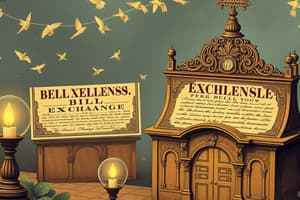Podcast
Questions and Answers
What is a bill of exchange primarily used for?
What is a bill of exchange primarily used for?
- Recording personal loans only
- Airing grievances in business
- Facilitating trade and credit transactions (correct)
- Documenting the purchase of assets
Which party is responsible for creating and signing a bill of exchange?
Which party is responsible for creating and signing a bill of exchange?
- Drawee
- Credit holder
- Drawer (correct)
- Payee
What characterizes a demand bill?
What characterizes a demand bill?
- Payable only on a future date
- Requires advance notice for payment
- Settlement occurs through goods instead of cash
- Payable on demand or presentation (correct)
What must a drawee do to accept a bill of exchange?
What must a drawee do to accept a bill of exchange?
What happens if a drawee fails to pay a bill of exchange at maturity?
What happens if a drawee fails to pay a bill of exchange at maturity?
What type of endorsement only includes the signature of the payee?
What type of endorsement only includes the signature of the payee?
Which of the following is NOT a characteristic of a bill of exchange?
Which of the following is NOT a characteristic of a bill of exchange?
How are bills of exchange treated in accounting?
How are bills of exchange treated in accounting?
Which type of bill is payable at a predetermined future date?
Which type of bill is payable at a predetermined future date?
Under which legal framework are bills of exchange governed in the U.S.?
Under which legal framework are bills of exchange governed in the U.S.?
Flashcards are hidden until you start studying
Study Notes
Bills of Exchange
-
Definition: A bill of exchange is a written, unconditional order directing one party to pay a fixed sum of money to another party on demand or at a specified future date.
-
Parties Involved:
- Drawer: The person or entity that creates and signs the bill, ordering payment.
- Drawee: The person or entity that is directed to pay the amount specified in the bill.
- Payee: The person or entity who receives the payment.
-
Characteristics:
- Must be in writing and signed by the drawer.
- Contains an unconditional order to pay.
- Specifies the amount to be paid and the due date.
- Can be transferable, allowing the payee to endorse it to another party.
-
Types:
- Demand Bill: Payable on demand or presentation.
- Time Bill: Payable at a predetermined future date.
-
Functions:
- Serves as a negotiable instrument, facilitating trade and credit.
- Provides a formal method for documenting credit transactions.
- Can be used to fund working capital needs.
-
Acceptance:
- The drawee must accept the bill by signing it, indicating their commitment to pay at maturity.
- Once accepted, it becomes a legally binding obligation.
-
Endorsement:
- The payee can transfer rights to the bill to another party by endorsing it.
- Endorsements can be blank (just the signature) or special (specifying the new payee).
-
Dishonor:
- If the drawee fails to pay at maturity, the bill is said to be dishonored.
- The holder can then take legal action to recover the amount owed.
-
Uses:
- Commonly used in trade for credit transactions, particularly in international commerce.
- Can also be used for personal loans and business financing.
-
Accounting Treatment:
- Recorded as part of accounts receivable or payable.
- Impact on cash flow and financial statements should be assessed when managing bills.
-
Legal Framework:
- Governed by the Uniform Commercial Code (UCC) in the U.S. and similar regulations in other countries.
- Must comply with applicable laws to ensure enforceability.
Bills of Exchange Overview
- A bill of exchange is a formal document that instructs one party to pay a specified amount on demand or at a future date.
Parties Involved
- Drawer: The individual or entity that creates and signs the bill, initiating the payment request.
- Drawee: The recipient of the payment order, responsible for making the payment.
- Payee: The party that receives the payment from the drawee.
Characteristics
- Must be a written document, signed by the drawer.
- Contains an unconditional payment order.
- Specifies the amount owed and due date clearly.
- Can be transferred through endorsement, allowing the payee to pass rights to another individual.
Types of Bills
- Demand Bill: Payable immediately upon presentation to the drawee.
- Time Bill: Payable at a specific date in the future as agreed upon.
Functions of Bills
- Acts as a negotiable instrument, facilitating trade and credit transactions.
- Provides formal documentation for credit arrangements.
- Used to obtain funding for working capital needs.
Acceptance Process
- The drawee indicates acceptance by signing the bill, committing to pay at maturity.
- Accepted bills are legally binding obligations.
Endorsement
- The payee can endorse the bill to transfer their rights to another party.
- Endorsements can be:
- Blank: Just the signature of the endorser.
- Special: Designates a specific new payee in the endorsement.
Dishonor Procedure
- A bill is considered dishonored if the drawee fails to fulfill payment at maturity.
- The holder may pursue legal action to recover the owed amount.
Practical Uses
- Widely utilized in trade and credit transactions, especially in international trade contexts.
- Applicable for personal loans and various forms of business financing.
Accounting Treatment
- Classified under accounts receivable or payable in financial records.
- Important to consider impacts on cash flow and overall financial statements during management.
Legal Framework
- Regulated by the Uniform Commercial Code (UCC) in the U.S. and similar laws in other jurisdictions.
- Compliance with relevant regulations is crucial for enforceability of bills.
Studying That Suits You
Use AI to generate personalized quizzes and flashcards to suit your learning preferences.




